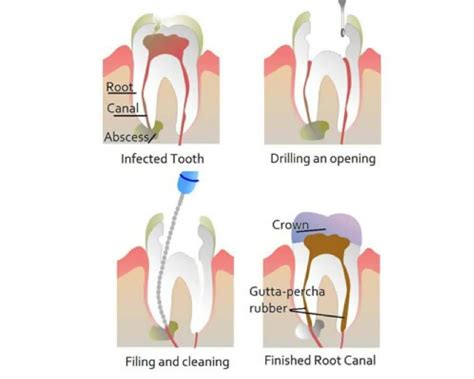How Do You Know A Root Canal Failed
Ronan Farrow
Apr 04, 2025 · 3 min read

Table of Contents
How Do You Know a Root Canal Failed?
Root canal treatment is generally successful in relieving tooth pain and saving the tooth. However, sometimes, despite the best efforts of your dentist, a root canal can fail. Understanding the signs of a failed root canal is crucial for seeking timely retreatment or alternative solutions to prevent further complications.
Common Signs of a Failed Root Canal
Several symptoms might indicate that your root canal procedure wasn't entirely successful. These symptoms often emerge gradually, but it's essential to pay attention to any changes in your tooth's condition.
Lingering or Recurring Pain
One of the most prominent indicators is persistent or recurring pain in the affected tooth. This pain might be similar to the pain you experienced before the root canal, or it could manifest differently – a dull ache, sharp throbbing, or sensitivity to temperature changes. Don't ignore persistent pain! It's a significant red flag.
Swelling and Tenderness
Swelling around the tooth or in the gums adjacent to it can be another sign. This swelling might be accompanied by tenderness to the touch. If you notice swelling or significant gum inflammation, schedule an appointment with your dentist immediately.
Abscess Formation
A failed root canal can lead to an abscess. An abscess is a pocket of pus that forms at the root tip of the tooth, resulting from bacterial infection. This can cause severe pain, swelling, and even fever. An abscess is a serious dental emergency.
Discoloration of the Tooth
The affected tooth might change color, becoming darker or grayer than its surrounding teeth. This discoloration occurs due to internal changes within the tooth caused by the infection. While discoloration alone isn't a definitive sign, it can be an indication of underlying problems.
Drainage or Sinus Problems
In some cases, a failed root canal can lead to drainage from the affected tooth or cause sinus problems. This is because the infection can spread to adjacent structures.
What to Do if You Suspect a Failed Root Canal
If you experience any of these symptoms, don't delay seeking professional dental care. Contact your dentist immediately to schedule an examination. They can diagnose the problem and recommend appropriate treatment, which may include:
- Retreatment: A second root canal procedure aims to clean and fill the root canals more thoroughly.
- Apicoectomy: A minor surgical procedure to remove the infected tip of the root.
- Tooth Extraction: In some cases, where the infection is extensive or retreatment is unsuccessful, tooth extraction might be necessary.
Early intervention is critical in managing a failed root canal. Prompt treatment can often save the tooth and prevent more extensive problems, such as jawbone infection or the need for more complex procedures.
Preventative Measures for Root Canal Success
While not a guarantee, maintaining excellent oral hygiene plays a significant role in the long-term success of root canal treatment. This includes:
- Regular brushing and flossing.
- Using fluoride toothpaste.
- Regular dental checkups and cleanings.
By being vigilant and seeking timely professional care, you can significantly increase the likelihood of a successful root canal and maintain good oral health. Remember, early detection and treatment are key!
Featured Posts
Also read the following articles
| Article Title | Date |
|---|---|
| How Does Japan Compare In Size With British Columbia | Apr 04, 2025 |
| How Does The Inheritance Games End | Apr 04, 2025 |
| How Hot Do Electric Baseboard Heaters Get | Apr 04, 2025 |
| How Do Celebrities Have Clear Skin | Apr 04, 2025 |
| How Did The Ballad Of Never After End | Apr 04, 2025 |
Latest Posts
-
How Is A Squeegee Used In The Silkscreen Process
Apr 04, 2025
-
How Is A Night Guard Supposed To Fit
Apr 04, 2025
-
How Is A Lateral Scored In Fantasy Football
Apr 04, 2025
-
How Is A Crown Replaced
Apr 04, 2025
-
How Invisalign Moves Teeth
Apr 04, 2025
Thank you for visiting our website which covers about How Do You Know A Root Canal Failed . We hope the information provided has been useful to you. Feel free to contact us if you have any questions or need further assistance. See you next time and don't miss to bookmark.
